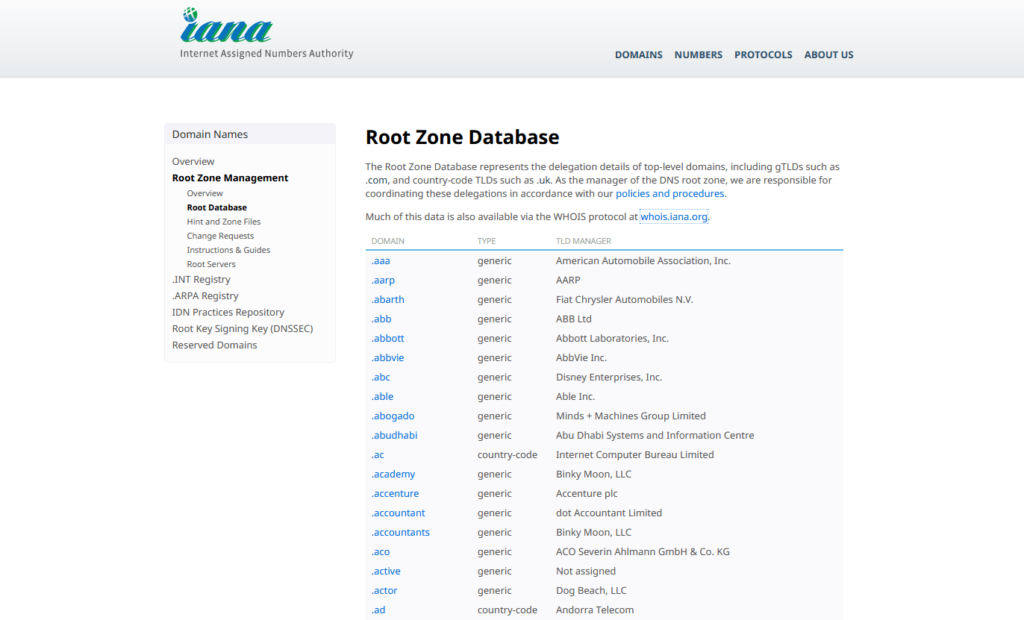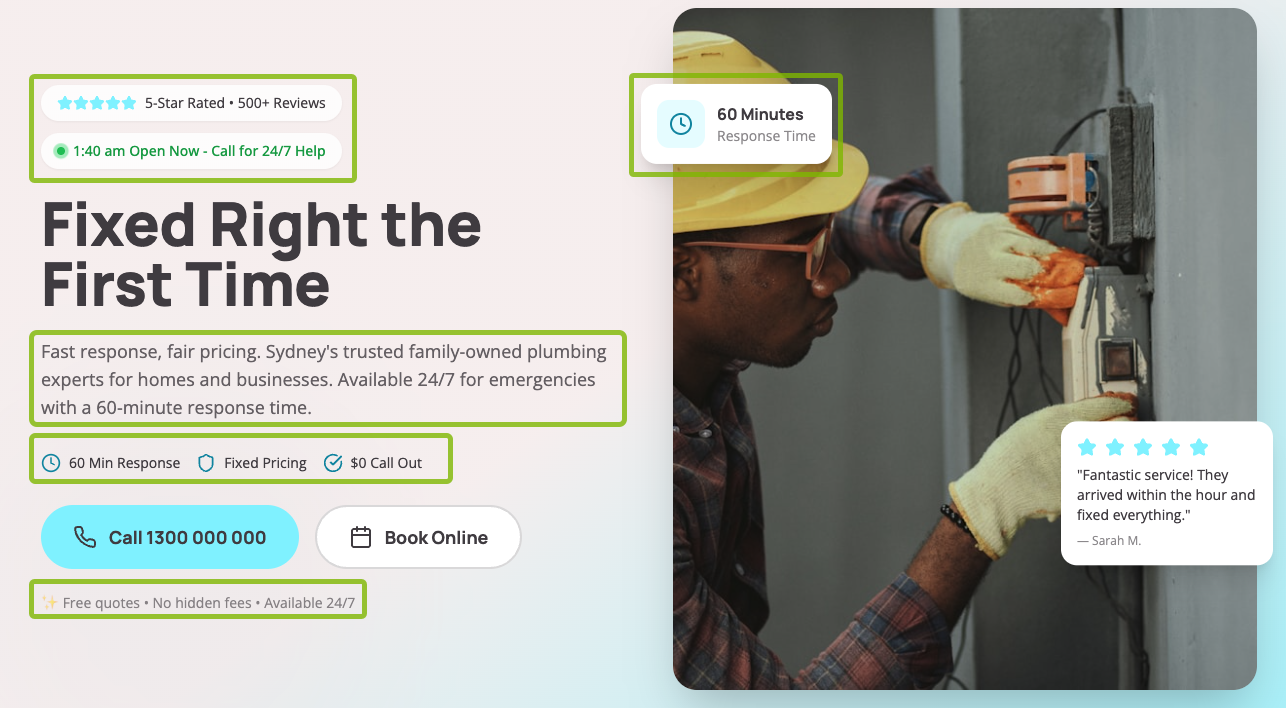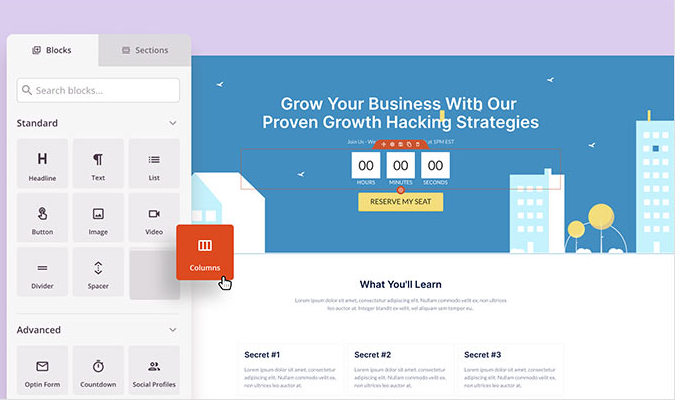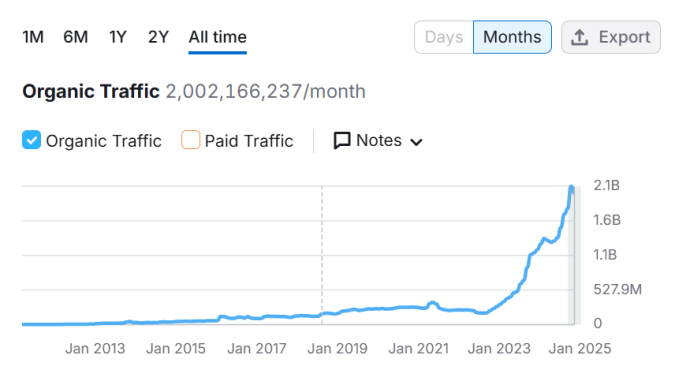A domain name points people directly to your website, and the few letters that make up your domain extension can say a lot about your site to visitors. Choosing a suitable domain extension for your site’s purpose and branding can be pivotal to its success. This comprehensive guide explains the purpose of domain extensions, the differences between popular extensions, and how to choose the best one for your new website.
The History of Domains
Although the internet didn’t become a household utility until the 1990s, domains have existed since 1983. Still, they weren’t available for the public to register through the Domain Name System (DNS) until 1986. What started with only a handful of domain extensions has now grown to include hundreds of top-level domains (TLDs), thanks to expanded rules that allow people and organizations to create their own domain extensions.
Domains began as a solution to a formerly complicated way of getting to a website, which involved typing a series of numbers that were virtually impossible to remember. Now, domains are a must-have for internet browsing, giving us a streamlined way to remember our favorite websites by simply plugging the domain name into a browser’s address bar.
Categories of Domain Extensions

You can find just about any domain extension through your domain registrar, but not all domain extensions are equal or relevant to your needs. It is helpful to understand the differences between domain extensions, like .com and .org, when deciding on the right extension for your website.
- Generic Domain Extensions: A generic domain extension (gTLD) is a type of TLD, an acronym for a domain extension, also known as the last part of a domain name. Generic domain extensions include some of the most common options, like .com, .net, and .org, and always have at least three letters following the dot. Anyone can use these extensions.
- Restricted Domain Extensions: Restricted domain extensions are generic TLDs that have specific requirements for those registering them. For example, .gov only allows registrants that are U.S. government entities and agencies, while .jobs is limited to websites with job openings or job listings.
- Country Code Domain Extensions: Country code domain extensions (ccTLDs) are reserved for each country. For instance, Thailand’s extension is .th, while the extension for the United Kingdom is .uk. Although some extensions are limited for use by their country’s citizens, businesses, or organizations, other country extensions are open to most registrants.
- Special-Use Domain Extensions: Extensions like .test and .local fall within this category, which limits them to specific technical uses. The Internet Assigned Numbers Authority (IANA) maintains these extensions and prevents them from being registered publicly through the DNS.
How to Choose a Domain Extension
While there are many domain extensions to choose from, it’s wise to be careful when choosing one for your site. Consider the following factors when deciding which domain extension is the best option.
Branding
Your website reflects your brand, and your domain points all traffic to that website. Therefore, your domain name is an extension of your website that needs to be included in the whole equation. For this part, you’ll need to tap into a bit of human psychology.
Think of a few sites you visit frequently. What are their extensions? Does the whole domain name look aesthetically pleasing with its extension? Do the extensions say, “This site is trustworthy” to you?
When people visit your site from a search engine, they notice your domain name. A domain like yourname.com probably seems more trustworthy than yourname.xyz. Why? Because we’re more familiar with .com since it’s the most prominent domain on the web, whereas .xyz isn’t used nearly as much. After years of internet usage, our brains are somewhat wired to find .com domains more familiar, trustworthy, and aesthetically pleasing.
The same holds true for some other domain extensions, like .org and .net. Using one of the more common domain extensions is typically the best way to go when prioritizing the branding factor. Having a recognizable domain extension can make your domain name more memorable.
Search Engine Optimization (SEO)
Google has said that having a not-so-common domain extension won’t affect your site’s SEO. That’s true; your domain extension doesn’t directly impact where your site shows up in Google’s search rankings. However, it could have an indirect impact on your SEO.
Piggybacking off what we said about branding and trust, your domain name may not be as appealing as others when it appears in the search rankings. Let’s say you have the domain gardenbusiness.xyz, while another page has the domain gardenbusiness.com. From what we know about trust and familiarity with domains, more people may gravitate to the .com version.
Similarly, a mobile app might do better in search results with a domain like myapp.io than myapp.biz because .io is becoming a popular extension for apps and tech-related sites. Therefore, indirectly, your domain extension could impact your SEO.
Website Purpose
The purpose of your website—personal, education, business, etc.—is another essential factor to consider when choosing a domain extension. For example, most nonprofit organizations opt for .org because it gives them a recognizable credibility factor while still setting themselves apart from education and government agencies.
If you have an online business, you might opt for .co or .biz, as both have become recognizable for business use. Informational sites, like tutorial or research sites, could choose .info to make it known what the purpose of the site is before anyone even clicks on the domain.
Location
Where your business is located may also play a role in the domain extension you choose, especially if your target market is also located in the same area. A ccTLD comes in handy if people searching for your business are likely to search for a company like yours in your specific location.
Let’s say someone was looking for “car repair Scotland.” Your domain is carrepair.co. Even though you’re located in Scotland, it’s not likely that the search results would pull up your site, as its extension doesn’t trigger location specifics. If your domain were carrepair.co.uk, you’d probably have a better chance of showing up in that person’s search results.
Old Vs. New Domains
Today, domain names are categorized into somewhat of an old school and new school system. Old school domains are the originals, like .com, .net, and .org. New school domains include those that arrived after the initial list of extensions, including those released with ICANN’s TLD update in 2013 and after. These include extensions like .info, .earth, .movie, and .health.
As you can see, new domains are often much more specific than the older domains. These can help indicate your site’s purpose before someone ever lands on your page, but they also don’t have the credibility factor that the trusted and established older domains do.
Pricing
Domain registrants price extensions differently. Factors that affect pricing include the current trendiness of the extension, who typically buys the domain, and how new the extension is. Extensions like .io, .ia, and .tech tend to be costlier than .com or .net because it’s often tech companies that snatch them up. Similarly, .inc is one of the priciest, as it’s usually incorporated businesses that buy it.
.Com remains one of the most affordable generic TLDs, followed by .net, .org, and .co. Of course, the exact domain you’re buying could be thousands of dollars if it’s one sold to the registrar for a lot of money. Generally, you can expect lower pricing from the oldest domains around, but available domain names will also be more limited.
Top 10 Domain Extensions & What They Are Best For
The following 10 domain extensions are among the most popular today that aren’t restricted in use. Here, we compare the most common uses for them and when using a different extension may be a better choice.
#1 – .Com
The .com extension is the most familiar of all domain extensions, making it the best fit for most websites. It technically stands for “commercial,” which applies to most sites on the web. The problem with .com domains is that they’re also the most used, meaning that the domain you want may not be available.
In that case, you might consider a different extension or adding in another word to make your domain name unique. For instance, yourbusiness.com might become yourbusinessnewyork.com.
#2 – .Net
.Net domains originated for network-type businesses, like email service providers or internet providers. As more .com addresses got snatched up, website owners moved into .net territory.
The extension isn’t seen as much today as when the internet began gaining popularity in the 1990s. Still, it remains one of the most chosen extensions on the web, aside from some ccTLDs, like .ru and .in. As internet-based “networks,” networking sites and online communities still find it beneficial to denote their purpose.
#3 – .Org
Short for “organization,” a .org domain usually goes to a nonprofit or public organization, community, or group. Local public businesses, like libraries and area Chambers of Commerce, also use the extension.
Although not always the case, many .org domains appear credible simply because of the extension, which could boost your site’s trust factor. However, you should avoid using .org for a blog or ecommerce site, as they’re not the intended subjects for the extension and could give visitors the wrong impression of your site’s purpose.
#4 – .Co
You’ve probably noticed .co domains popping up more within the last five years or so. This one stands for both “corporation” and “company,” making its biggest users businesses. More specifically, online companies seem to choose this most, opting for it as an alternative to already taken .com addresses.
.Co is also a popular one to pair with ccTLD extensions, like co.be or co.uk, to distinguish a business location. Dropping the .com in favor of .co makes the overall domain name slightly shorter and more aesthetically pleasing.
#5 – .Io
.Io is an increasingly popular option for mobile and computer app websites and landing pages. Tech-focused sites also choose .io, especially tech startups. This extension is also one of the most fun to play around with if you have a business name it fits well with, like portfol.io or stud.io.
While .io is becoming more recognizable in the IT and gaming industries, people who don’t follow those industries may not recognize it as trustworthy. And since many .io domains are currently foreign language-based, general confidence in the extension might waver.
#6 – .App
You might have guessed that .app is intended for apps to use, offering a more specific designation than .io or .com. Several of today’s top apps use the .app extension, including Albert.app, Sitter, app, and Cash.app.
There’s a bonus that comes with this particular extension, though: It’s on Chrome’s HTTP Strict Transport Security (HSTS) preload list, meaning that it comes with an automatic HTTPS secure connection. This helps build trust for your visitors from the moment they come to your site.
#7 – .Info
.Info is a gTLD that’s short for “information,” but anyone can technically use it. Still, it’s best for sites that offer informational resources, like tourist information for an area or employee resources in an organization. It’s also the first domain to use more than just three letters and the first to support internationalized domain names (IDNs).
It’s best to use this extension only if you can keep up with expectations that your site has helpful information. Otherwise, you might lose visitors who were hoping for it.
#8 – .Inc
A .inc domain has become more popular as an alternative to .com, .net, and .org, which are somewhat oversaturated. Usually, incorporated businesses choose this extension, although it’s open to anyone.
.Inc domains come with an array of benefits for businesses from B2B companies. For example, Intuit QuickBooks gives .inc domains 12 months of QuickBooks Online Simple Start, while 99Designs gives free Power Packs and discounts on logo creation. You can even get free business formation from LegalZoom.
The benefits of a .inc for businesses are numerous, but they come with a cost. .Inc domains are much more expensive than others, costing $1,098 with NameCheap and $1,999 with GoDaddy for the first year.
#9 – .Biz
Another domain created for business use, .biz signifies a website as a business, usually online. The extension arrived in 2001 and, by 2008, had over two million domain registrants using it.
While .biz helps business websites immediately state their purpose, they’re still not nearly as recognizable as .com and .org domains. Unfortunately, plenty of scams and messy websites have cluttered the extension, making it less trustworthy than some others from a visitor’s perspective.
#10 – .Icu
.Icu is a popular internet acronym, short for “I see you.” You may not see this extension on the web much yet, but it’s one of the more popular choices of the newer domain names.
There’s no clear intention for this domain extension other than attempting to be a little more innovative. People and businesses who opt for a .icu domain typically search for a domain name that’s fun, memorable, and different from more generic .com and .net domains.
Conclusion: .Com Is Still the Best Option
In general, .com is still the best option for a domain extension for most websites. It’s familiar, it has decades of trust under its belt, and it’s easy for people to remember. That’s not to say that other newer extensions can’t get there, but many haven’t reached that level yet.
If your business is all about innovation, you might feel comfortable reaching for a different extension that’s a little trendier and fun, like .io or .icu. For example, technology and forward-thinking companies can show off their uniqueness with these domains.
Most importantly, your extension should match your mission. Having a .info domain for an ecommerce business will only confuse potential customers, but sticking with .com or .co can make more sense for your purpose. Your ultimate goal should be to find a domain that you not only love but that also makes it clear what visitors can expect when they click over to your site.






